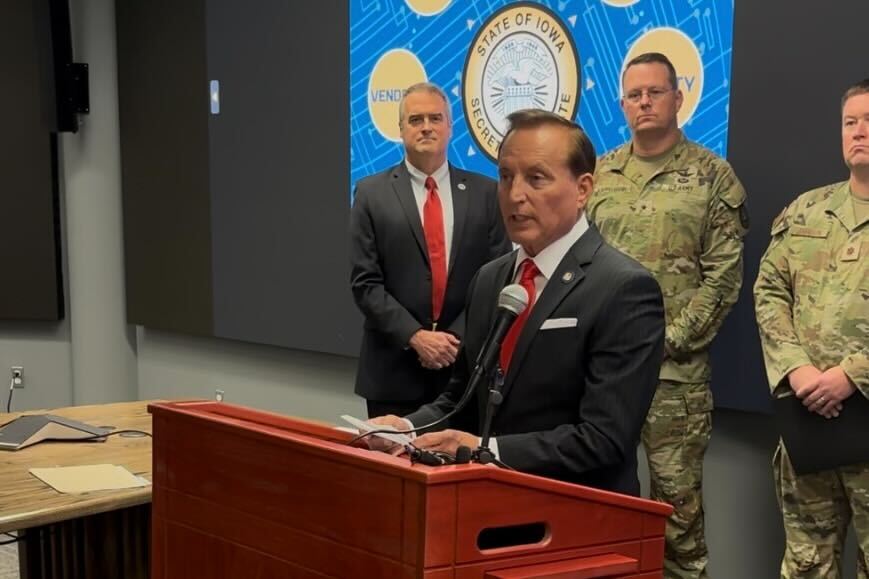
A federal judge declined to intervene in Iowa's order to poll workers to challenge a list of over 2,000 registerd voters.
Despite known issues with driver’s license records, the Iowa Secretary of State’s voter challenges targeted 2,022 registered voters—including naturalized citizens who can legally vote.
Ruth Toomer will be the first to admit that WHO 13 News is on a little loud in the morning. Last week, the family was getting ready for work: her husband was dressing, her 13-year-old eating breakfast. But the news stopped her dead in her tracks.
“We follow politics pretty closely,” Toomer said. “We wondered, what are they trying to pull now?”
The morning report explained that the state was planning to challenge the ballots of registered voters. The list was being kept confidential. But while the Secretary of State’s list was an effort to crack down on non-citizen voters, recently naturalized citizens like her were reportedly on the list.
Toomer moved to the US four decades ago. As a teenager, she truthfully marked “no” on her driver’s license application when asked about citizenship. In 2022, she became a naturalized citizen and was excited to vote in her first presidential election.
But now she feared being on the Secretary of State’s list of challenged voters.
“I called the Secretary of State, and they said I had to call my auditor. But when I called my auditor, they said I had to call the Secretary of State,” Toomer said. “It was this back-and-forth.”
Unable to get answers about her status, Toomer said she plans to carry her citizenship certificate to the polls Tuesday.
The problem stems from using many-years-old data from the Iowa Department of Transportation’s Online Voter Registration database. People going through the citizenship process often qualify for licenses before becoming citizens. When applying, they accurately report their non-citizen status. However, the database does not update when they gain citizenship, leaving them marked as “non-citizen” even after their naturalization ceremony.
Iowa Starting Line has found that the Iowa Secretary of State’s Office has been aware of this flaw for at least two years, and decided to use the data anyway.
Back in December 2022, now-state Rep. Adam Zabner, a Democrat from Iowa City, contacted the Secretary of State’s Office about a resident of North Liberty—a new citizen—who was wrongly flagged as ineligible to vote by the DOT’s online voter registration system.
“You have to understand, he’s just become a citizen. And he’s very concerned about ensuring that he does things right,” Zabner said. “He has jumped through all the hoops to get here.”
Molly Widen, the legal counsel for the Iowa Secretary of State, told Zabner that they were working with the DOT to resolve the issue.
“I am expecting the changes will be completed soon,” Widen wrote on Dec. 9, 2022.
Despite this knowledge, the Secretary of State Paul Pate’s office requested this data from the DOT Oct. 1. After receiving it on Oct. 7, his office identified 2,022 registered voters who had reported non-citizenship to the DOT between 2000 and the present—without verifying if they’d since become citizens.
“We’ve always been aware that this list has not been 100%,” Pate said Wednesday during a press conference. He cited issues working with the Systematic Alien Verification and Entitlement (SAVE) service which governments use to verify a person’s citizenship. Pate’s office didn’t return comment on what issues he had using SAVE.
When asked about the issue, a spokesperson from the US Citizenship and Immigration Services, which manages SAVE, said the service is available to “registered and authorized agencies, including election authorities in states.”
Several county auditors have reported being able to verify the citizenship of the people on Pate’s challenge list.
“I’m very confident that there are not 2,000 (ineligible voters on the list), but sadly we are forced to have to work with the information we have available because the federal government has tied my hands,” Pate said. “We cannot do a redo on an election.”
Zabner said using “faulty data” to challenge these registered voters was unacceptable for the state’s highest election official. He sees it as part of a larger right-wing effort to sow distrust by pointing to noncitizen voting ahead of the 2024 election.
“Look, for me, voting rights are a sacred part of this country,” he said. “For me, it’s not about how it impacts which candidate wins an election, but about every Iowan having access to their constitutional voting rights.”
Civil rights group sue to protect the 2,022 challenged voters
Late Wednesday night, voters who were a part of Pate’s list elected to sue the Secretary of State and several auditors.
The national ACLU, ACLU of Iowa and a Des Moines-based law firm argue the voter challenges violate the equal protection and due process clauses, in addition to the National Voter Registration Act and Voting Rights Act. The lawsuit called the voter challenges an “ill-conceived, faultily executed, and unlawful voter purge effort.”
“Every American citizen possesses the fundamental right to vote, regardless of where they were born or how recently they became a citizen,” the lawsuit said. “Flagrantly disregarding the rights of Iowa’s newest citizens, the Secretary’s Voter Purge Program ensures that new citizens are targeted, challenged, and investigated for exercising their basic right of citizenship and participating in our democracy having recently sworn oaths of fidelity to the Constitution.”
Among the list of plaintiffs is Orçun Selçuk of Decorah, who first told Iowa Starting Line about having his ballot challenged by the state. There are three other plaintiffs from Johnson, Polk and Scott counties, as well as the League of United Latin American Citizens of Iowa.
The lawsuit argues that Pate’s voter challenges single out voters based on their national origin and newly earned citizenship status, requiring them to provide additional documentation to have their ballots count. That subjects them to extra scrutiny.
Under the 14th Amendment of the US Constitution, states cannot deny a person equal protection under the law. The lawsuit argues “arbitrary and disparate treatment”—forcing these new citizens to jump through an additional hoop to make sure their ballot counts—is not legal.
Further, by keeping the list secret, the lawsuit argues that affected voters did not have adequate opportunity to resolve their eligibility, violating their right to due process. By doing it within the federal 90-day freeze period on voter roll purges, it says the challenges violated federal law.
The ACLU is asking a judge to declare the challenges unconstitutional, to restore the voting rights of affected voters, to notify poll workers that eligible voters can vote, and to award legal costs and fees.
Support Our Cause
Thank you for taking the time to read our work. Before you go, we hope you'll consider supporting our values-driven journalism, which has always strived to make clear what's really at stake for Iowans and our future.
Since day one, our goal here at Iowa Starting Line has always been to empower people across the state with fact-based news and information. We believe that when people are armed with knowledge about what's happening in their local, state, and federal governments—including who is working on their behalf and who is actively trying to block efforts aimed at improving the daily lives of Iowan families—they will be inspired to become civically engaged.


Iowa Republicans make outlawing gay marriage key 2024 campaign priority
Iowa Republicans have made outlawing gay marriage a key goal in their 2024 party platform. During the Iowa GOP’s 2024 state convention on Saturday,...

Department of Justice says Iowa immigration law violates US Constitution
If Iowa doesn’t suspend the enforcement of its new immigration law by May 7, the state could face a federal lawsuit, according to the Des Moines...

Rushing: Iowa State president said the quiet part out loud
I want to thank Iowa State University President Wendy Wintersteen for doing us all a favor by finally saying the quiet part out loud: all the...

Iowa sets aside almost $180 million for year two of voucher program
Iowa has committed nearly $180 million in taxpayer funds to support private school tuition in the 2024-25 school year, which is almost $50 million...

Kalbach: Immediate action needed on corporate ag pollution
Iowa agriculture has undergone substantial changes over the past 40 years. We see it all around us. Rather than crops and livestock being raised on...

VIDEO: Jochum calls Gov. Reynolds’ summer meal program a ‘hunger game’
Iowa Gov. Reynolds announced a competitive $900,000 grant program to feed Iowa children over the summer, months after she declined $29 million in...





